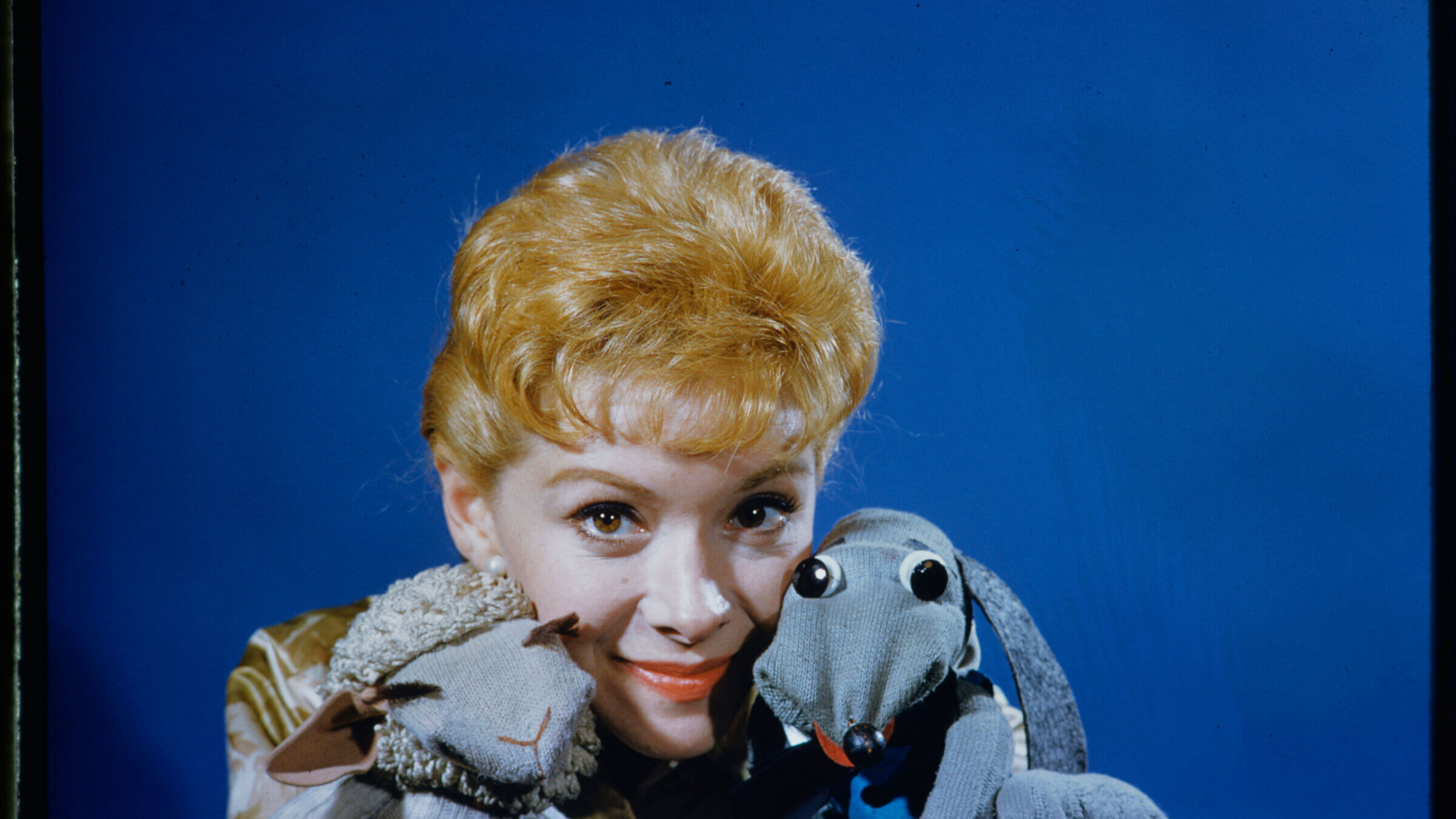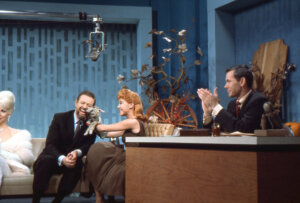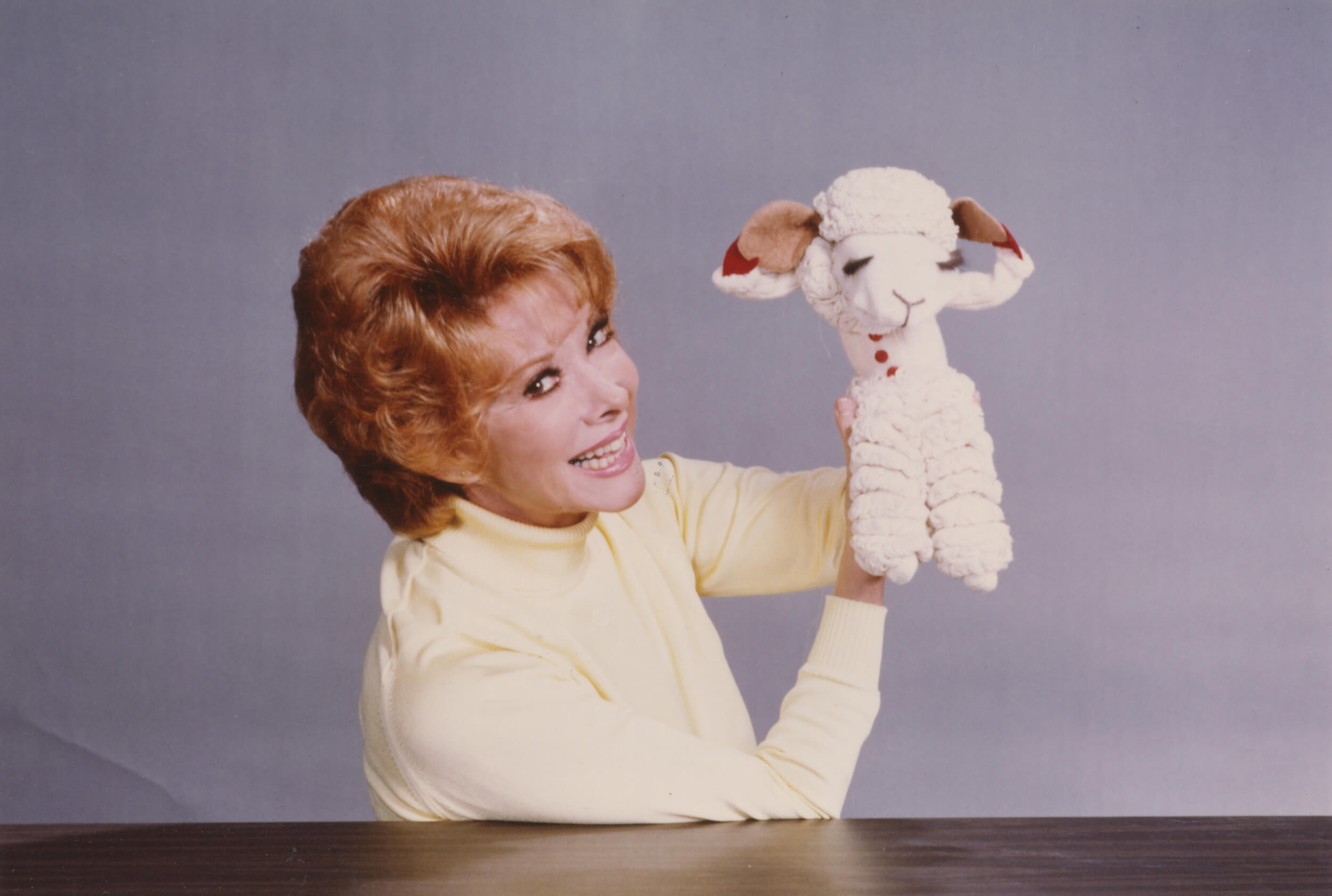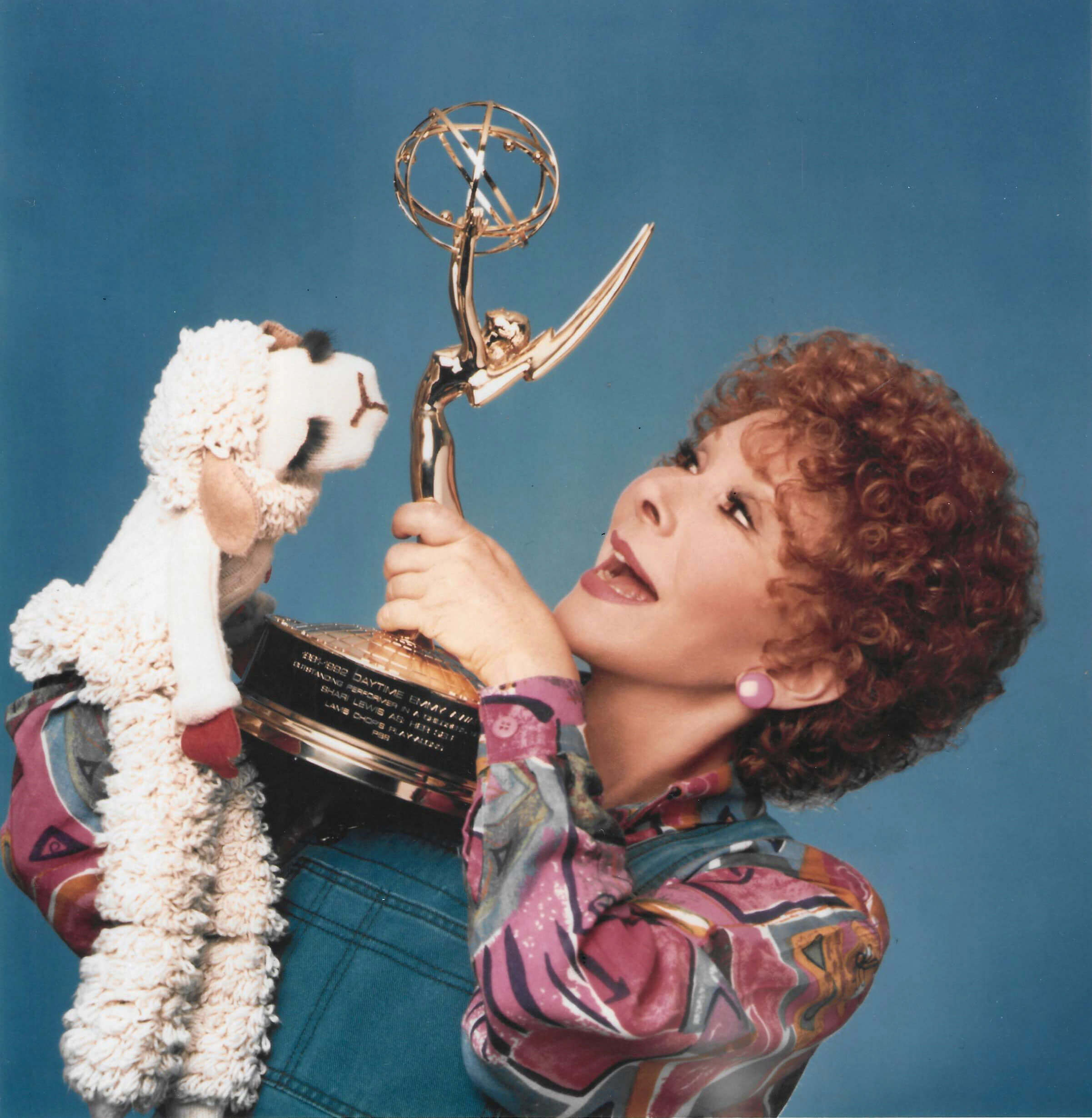Shari had a little lamb — and changed the world with her
‘Shari Lewis and Lamb Chop’ explores the varied career of the children’s entertainer

Shari Lewis with Lamb Chop and Hush Puppy. Courtesy of Kino Lorber
If you go on YouTube, you can watch an act of creation that rivals Genesis 2:7.
A young Shari Lewis calls out for Lamb Chop, who is in a deep state of slumber. The little lamb has her back feet tucked into her mouth; as they plop out and she begins to stir, Lewis blows a jet of air into the puppet’s face. She awakens, like Adam from his clay.
The 1958 screen test for NBC appears in the new documentary Shari Lewis & Lamb Chop by Love, Gilda director Lisa D’Apolito. It was early on into a lifelong bond between Lewis and her signature creation, a fleecy 6-year-old sheep with heavy lashes and pluck of a magnitude seldom seen in children’s television.
What is revelatory about the documentary, for a viewer who first encountered Lewis in her third act on PBS, when she returned to children’s programing, is just how long Lamb Chop was absent from the airwaves, and the inexhaustible industry her creator put into keeping her career afloat. Lewis was also in the business of recreating herself.
Lewis grew up in the Parkchester housing complex in the Bronx. Her Vilna-born father, Abraham Hurwitz, was a professor of education at Yeshiva University who was named New York City’s official magician under Fiorello LaGuardia. Her mother, Ann, was head of the music department of the Bronx school system. Conditions were lab perfect for Lewis to be both an entertainer and educator, but ventriloquism was a relatively late development.
It was only when Lewis, a dancer, broke her leg that she started experimenting with puppets, studying under the tutelage of John W. Cooper, a trailblazing Black ventriloquist celebrated for his act “Fun in a Barber Shop,” in which he cut the hair of a row of puppets as he voiced them. The petite Lewis’ first puppets were nearly half her size, including the ones she used in an act billed as a “Jewish content program designed to delight as well as educate.”

But when Lewis was advised to bring a more compact co-star onto Captain Kangaroo, she started playing with a little lamb she had in her collection.
“I kept looking for God in my puppets and could not find,” Lewis said in an interview featured in the film, “until Lamb Chop.”
With Lamb Chop, Lewis booked her own TV shows, helping to create the format for children’s programming years before Sesame Street and Mr. Rogers’ Neighborhood.
Her rise was meteoric, and much-merchandised, and many puppeteers interviewed for the documentary marvel at Lewis’ ability to maneuver Lamb Chop on one hand and Charlie Horse on the other. And, what’s more, to have conversations with her alter egos that she wouldn’t be allowed to raise alone, like the prospect of a woman president.
But while Lewis kept innovating, eventually staging weekly musicals with the likes of Dom DeLuise, NBC cancelled her Peabody-winning show in 1963 to make room for cartoons. Lewis heard of the decision when male executives discussed it on an elevator, not realizing she was riding with them, according to her daughter, Mallory Lewis.
The cancellation pushed Lewis out to Hollywood, where she began appearing on variety shows, dancing and singing with a life-sized puppet of Fred Astaire and landing guest roles (sans Lamb Chop) on shows like The Man from U.N.C.L.E.

Lewis was a dynamo, but the people demanded Lamb Chop. Reintroducing the puppet to a more adult act and audience made for uncomfortable developments. In a Las Vegas nightclub, Lamb Chop would come onstage drunk as Foster Brooks and occasionally make passes at male guest stars. (She once kissed Larry King on the mouth and posed as a Playboy Bunny with Lewis.)
“Lamb Chop could be flirtatious, irrepressible and uncontrolled,” Mallory Lewis says in an interview. “My mom never got to be those things.”
Behind the scenes, Lewis’ second marriage (the first, to her teenage sweetheart, the TV executive Stan Lewis, ended after he was let go following the 1950s quiz show scandal) was fraught. Her husband Jeremy Tarcher embraced the New Age lifestyle — and all its accompanying psychedelics Lewis had no time for or interest in.
While holding together the marriage, Lewis never stopped working. She would play to crowds of four at state fairs and, in an embrace of her musical roots, begin conducting symphonies — including a more-than-two-hour show in Japan, for which she learned Japanese.
Lewis’ return to children’s television in the 1990s, with the shows Lamb Chop’s Play-Along and Charlie Horse Music Pizza, was legendary and tragically short-lived.

Then in her 60s, she brought in an audience of children to the studio and made it to her mission to endow them with self-esteem, a continuation of her father’s work building community through free magic shows. (In the spirit of l’dor v’dor, Mallory joined the crew, and they won the first-ever Mother-Daughter Emmy.)
Lamb Chop testified before Congress on behalf of the Children’s Television Act and Lewis’ advocacy was tireless, even when she was given six weeks to live with a terminal cancer diagnosis.
D’Apolito’s film ends with footage of Lewis’ final performance of a song called “Hello, Goodbye.” You can see her crew holding back tears as Lewis bids farewell to them and the new generation of children who grew up watching her. She is, thankfully, survived by Lamb Chop, now operated by Mallory, who first met the character in her crib, in live shows and on TikTok.
Perhaps the biggest revelation from Shari Lewis and Lamb Chop is how seriously Lewis took the business of play. However whimsical she may have been in performance, she, like that other groundbreaking redhead Lucille Ball, was tough, practical and business-minded. If her husband was a seeker, Lewis was a “doer.”
And though her devotion to Jewishness is apparent in her holiday specials and books of Jewish stories (and also a New Testament equivalent co-authored with Florence Henderson), she had her own qualms with religion.
“The only meaningful religious ceremony is life itself,” she says in an interview clip included near the film’s final minutes.
Lewis’ mission to build confidence in children sanctified life, and in her own acts of creation, made a ritual all her own.
Lisa D’Apolito’s Shari Lewis & Lamb Chop opens theatrically in New York July 18 and in Los Angeles July 25, with a national release to follow.

















